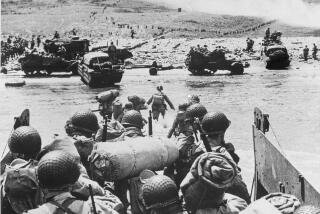Royal Air Force Bested Hitler’s Best in WW II’s Heroic Battle of Britain : In September, 1940, Germany laid siege to London. At the time, Joseph W. Grigg was a correspondent for United Press in Berlin.
- Share via
On Sept. 14, 1940, a hot, brilliantly sunny Sunday, Adolf Hitler’s Nazi-controlled Berlin radio launched an all-out propaganda campaign to announce to the world the climax of what later became known as the Battle of Britain and the start of the German Luftwaffe’s bombing blitz against London.
Along with other foreign correspondents in Berlin, I was summoned to a special Sunday afternoon news conference at the Nazi Propaganda Ministry.
Raucous trumpet fanfare, special Nazi government communiques and purported eyewitness stories by breathless Nazi radio reporters--this was long before the days of television--and a new battle tune titled “Bombs on England” kept the German radio running at white heat throughout that late summer Sunday and the next week.
With the defeat and surrender of France in June, 1940, Britain had been left alone to face the might of Hitler’s victorious Wermacht and a Luftwaffe that was at that time the world’s most formidable air force.
Over the English Channel and the green fields of southeast England, young, largely inexperienced and heavily outnumbered British Royal Air Force fighter pilots plunged in their Spitfires and Hurricanes into battle with the Luftwaffe’s crack Messerschmidt 109 and 110 squadrons.
Nazi bombers blasted Britain’s fighter airfields at Manston, Biggin Hill and elsewhere in southeast England in a bid to smash the Royal Air Force’s fighter resistance.
Hitler’s strategy, as expanded at the time to American and other neutral reporters in Berlin by Nazi officials, depended first on defeating the small, greatly outnumbered RAF.
His goal was nothing less than the invasion and defeat of Britain and its elimination from the war. By September, 1940, Hitler already had given orders to his commanders to prepare for what was to be know as “Operation Sealion,” the code name for a planned invasion of England.
But Britain’s powerful Royal Navy still controlled the English Channel. Nazi officials with whom I talked argued that if the RAF were first driven from the skies, a German invasion armada could cross the Channel under what was described as an “umbrella” of Nazi bombers and fighter planes, against which, it was claimed, Britain’s Royal Navy would be powerless to block the planned invasion.
Before this, Hitler’s master plan called for a general softening up of British government and civilian morale by means of devastating air raids on London and other big British cities by the concentrated might of the Luftwaffe.
So convinced were the Nazis that this strategy would succeed that officials in Berlin boasted that within weeks they would be holding news conferences in Buckingham Palace, home of Britain’s royal family.
Three German reporters of my acquaintance bet me 25 bottles of Champagne that by July 1, 1941, London and the rest of the British Isles would be under Nazi occupation. I never collected on that bet because, by the target date in 1941, Champagne was practically unobtainable in Germany.
For the coming Battle of Britain, Hitler named one of his top aides, Reichsmarschall Hermann Goering, to be Luftwaffe supreme commander.
Goering concentrated all his available air strength of 3,000 planes in occupied northern France. He set up his own headquarters on the French channel coast from which in clear weather he could stare across the 20 miles to the white chalk cliffs of Dover.
In the last days of August and early September, Goering unleashed his bomber fleets to attack British coastal shipping and ports and to pound key RAF fighter bases in southeastern England. His aim was to drive the RAF back into the interior of the country.
But the British managed to make their fighter bases usable again much faster than the Nazis had expected.
In the ensuing air battles the RAF’s Spitfires and Hurricanes suffered grievous losses. Between Aug. 24 and Sept. 6, according to British figures, Britain lost nearly one-fourth of its 1,000 fighter pilots.
But the RAF still survived as an effective fighting force.
As Winston Churchill declared later in a historic speech to the British House of Commons, “Never in the field of human conflict was so much owed by so many to so few.”
Sept. 14 and 15 are commemorated in Britain. On those two days the Luftwaffe launched its greatest concentrated onslaught yet in daylight attacks against London. But postwar information has shown that Luftwaffe losses on those days alone were 56 fighters and bombers. British losses were about half that number.
British leaders had estimated that in order to survive, the RAF needed to down three Luftwaffe planes to every one RAF plane lost.
Despite grim RAF losses, the result of the Battle of Britain was a defeat for the Luftwaffe. All told, in three months in 1940 the Luftwaffe lost nearly 2,000 planes. Hitler had to abandon forever his plan to invade England.
British civilian morale remained high despite 20,000 casualties and long nights spent in bomb shelters and London subway tunnels.
An angry Goering returned from northern France to Berlin after delivering a tongue-lashing to his Luftwaffe pilots with these words, “You have not only deeply disappointed me, you have betrayed me.”
Nearly four years after the defeat of Hitler’s plan to invade Britain, U.S., British and Canadian forces crossed the English Channel to Nazi-occupied Europe on D-Day, June 6, 1944, the forerunner of Allied World War II victory in Europe.
More to Read
Sign up for Essential California
The most important California stories and recommendations in your inbox every morning.
You may occasionally receive promotional content from the Los Angeles Times.













